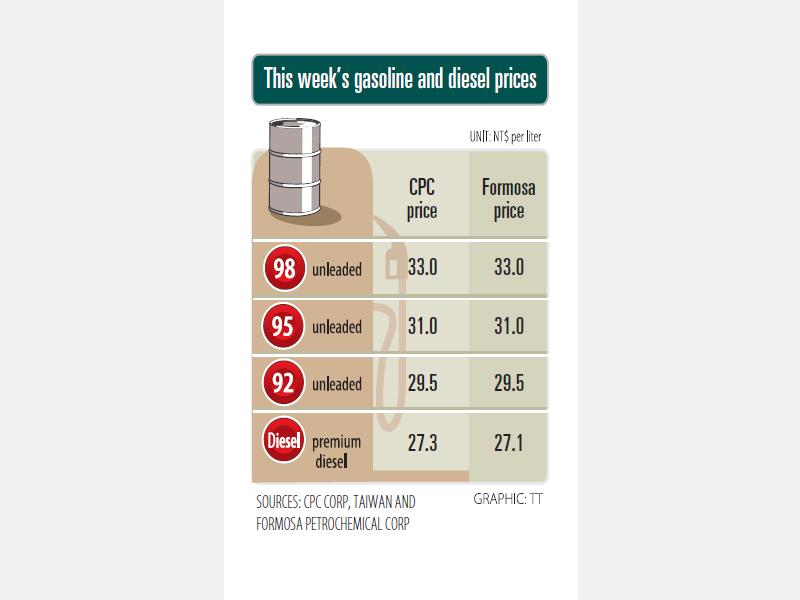Gasoline and diesel prices are to remain unchanged this week, CPC Corp, Taiwan (CPC, 台灣中油) and Formosa Petrochemical Corp (台塑石化) said yesterday, even though international crude oil prices moved higher.
Gasoline prices at CPC stations are to stay at NT$29.5, NT$31.0 and NT$33.0 per liter for 92, 95 and 98-octane unleaded gasoline respectively, the state-run refiner said in a statement.
The price of premium diesel is to remain at NT$27.3 per liter, it said.

Saudi Arabia’s planned price increases for shipments to Asia and Europe next month, as well as the arrival of the peak holiday driving period in the northern hemisphere, led to increases in international crude oil prices last week, CPC said.
Based on CPC’s floating oil price formula, the cost of crude oil last week rose 3.72 percent from a week earlier.
The refiner said it should have raised gasoline prices this week by NT$7.6 per liter and diesel prices by NT$9.3 per liter.
However, in compliance with a government policy to keep consumer prices stable and fuel prices lower in Taiwan than in neighboring markets, CPC said it would absorb the increases by implementing a price stabilization mechanism.
Formosa Petrochemical’s prices for 92, 95 and 98-octane unleaded gasoline are to stay at NT$29.5, NT$31.0 and NT$33.0 per liter respectively, while the price of premium diesel is to remain at NT$27.1 per liter.

TRADE WAR: Tariffs should also apply to any goods that pass through the new Beijing-funded port in Chancay, Peru, an adviser to US president-elect Donald Trump said A veteran adviser to US president-elect Donald Trump is proposing that the 60 percent tariffs that Trump vowed to impose on Chinese goods also apply to goods from any country that pass through a new port that Beijing has built in Peru. The duties should apply to goods from China or countries in South America that pass through the new deep-water port Chancay, a town 60km north of Lima, said Mauricio Claver-Carone, an adviser to the Trump transition team who served as senior director for the western hemisphere on the White House National Security Council in his first administration. “Any product going

STRUGGLING BUSINESS: South Korea’s biggest company and semiconductor manufacturer’s buyback fuels concerns that it could be missing out on the AI boom Samsung Electronics Co plans to buy back about 10 trillion won (US$7.2 billion) of its own stock over the next year, putting in motion one of the larger shareholder return programs in its history. South Korea’s biggest company would repurchase the stock in stages over the coming 12 months, it said in a regulatory filing on Friday. As a first step, it would buy back about 3 trillion won of paper starting today up until February next year, all of which it would cancel. The board would deliberate on how best to effect the remaining 7 trillion won of buybacks. The move

China’s Huawei Technologies Co (華為) plans to start mass-producing its most advanced artificial intelligence (AI) chip in the first quarter of next year, even as it struggles to make enough chips due to US restrictions, two people familiar with the matter said. The telecoms conglomerate has sent samples of the Ascend 910C — its newest chip, meant to rival those made by US chipmaker Nvidia Corp — to some technology firms and started taking orders, the sources told Reuters. The 910C is being made by top Chinese contract chipmaker Semiconductor Manufacturing International Corp (SMIC, 中芯) on its N+2 process, but a lack

NVIDIA PLATFORM: Hon Hai’s Mexican facility is to begin production early next year and a Taiwan site is to enter production next month, Nvidia wrote on its blog Hon Hai Precision Industry Co (鴻海精密), the world’s biggest electronics manufacturer, yesterday said it is expanding production capacity of artificial intelligence (AI) servers based on Nvidia Corp’s Blackwell chips in Taiwan, the US and Mexico to cope with rising demand. Hon Hai’s new AI-enabled factories are to use Nvidia’s Omnivores platform to create 3D digital twins to plan and simulate automated production lines at a factory in Hsinchu, the company said in a statement. Nvidia’s Omnivores platform is for developing industrial AI simulation applications and helps bring facilities online faster. Hon Hai’s Mexican facility is to begin production early next year and the